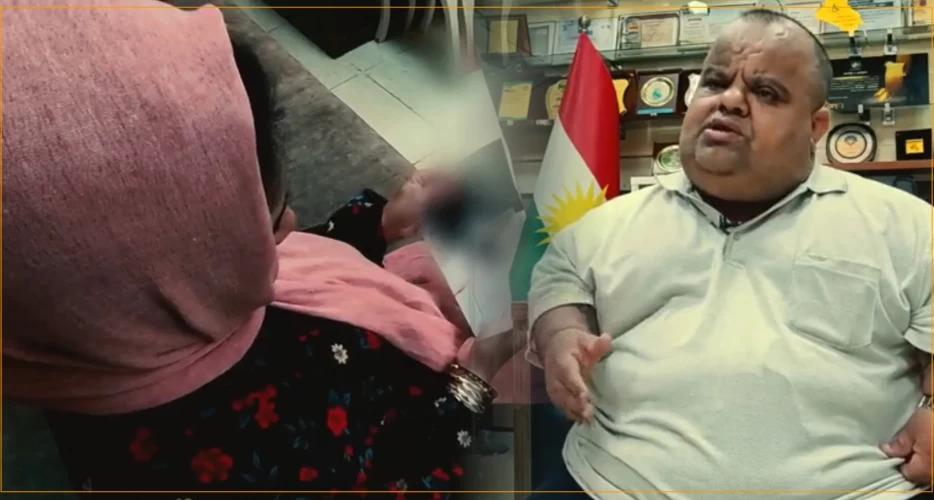In search of a dignified life, dwarfs in Kurdistan Region living off scant government benefits

PEREGRAF- Hardi Osman
Shilan Ghafur lives in a rented house, raising her two children by herself and subsisting off meager government benefits that are paid intermittently. For her and others with dwarfism, life in the Kurdistan Region is a struggle.
She divorced from her husband three years ago, a stark divergence from the life that she imagined when she married for love in 2013.
"I only had my disability benefits and you know that we only get it every three or four months, so we couldn't rent a house at a time when they were asking for 275,000 to 400,000 Iraqi dinars [$190 to $275] per month," Ghafur told Peregraf.
"Due to the financial crisis and our inability to pay rent, we separated," she said, insisting that she had decided not to marry again.
In the Kurdistan Region, dwarfs are deprived of most of their rights, discriminated against in employment, and forced to rely on government handouts that do not translate into a dignified life.
There are more than 4,100 dwarfs living in the Kurdistan Region according to official statistics, but "the government thinks we are not even worthy of a 150,000 Iraqi dinar [$104] payment," said Omar Jabbar, head of the Kurdistan Dwarfs Association, told Peregraf.
"They have no other income, but dwarfs have children…Their lives are getting harder and worse day-by-day," he added.
Divorce is common among couples with dwarfism because they find that they are unable to live a "suitable and worthy life" based on their economic circumstances, Jabbar said, noting that "more than 220 couples who are dwarfs have separated in Erbil, Duhok, Sulaimaniyah, and other cities and towns."
Jabbar said that he frequently hears disturbing stories about the things dwarfs in the Kurdistan Region do to get by, relating to Peregraf a story about a woman who gave up her children because she could not take care of them. Her plan was then to try to sell her kidney to make extra money.
Under the Iraqi Constitution, the laws of the Kurdistan Regional Government (KRG), and international laws and treaties, people with disabilities have the right to a decent and dignified life. But this is not upheld in practice.
The collapse of Ghafur’s marriage has left her discouraged, saying that she was unable to make it work in the face of intense financial challenges.
"Marriage is very difficult for us, but God facilitates it. Otherwise, it is very difficult. I just want to raise my two children and I don’t want to relive what I have suffered," Ghafur’s said.
Avin Hama-Karim, a social researcher who works on cases like that of Ghafur and her husband, told Peregraf that the problems facing people with dwarfism are multifaceted.
"There is no single solution to this problem," Hama-Karim said. If their housing problems are addressed, they have other issues, including lack of income and job opportunities.
"It disheartens people," She said, adding that dwarfs face routine discrimination solely on the basis of their short stature.
"The Ministry of Social Affairs has the responsibility to defend the rights of dwarfs and provide them with opportunities. They are talented and skilled people and, once they go to work, they do not feel any shortcomings and do not feel like they are a different class from other people. This goes a long way to solving their problems," Hama-Karim said.
This year, the Kurdistan Parliament amended the Law on the Rights and Privileges of Disabled persons no. 22, 2011. According to the new language, 5 percent of jobs at government departments and larger private firms should be allocated to dwarfs and people with disabilities.
The law also says that people with disabilities should not be deprived of the opportunity to work because of their physical condition, private sector companies are obliged to employ them, and a percentage of accessible and appropriate housing in developments should be allocated for their use.
Gulistan Saeed, a Gorran MP who is the deputy chair of the Committee for Social Affairs and Human Rights, told Peregraf that "it is the responsibility of the KRG to increase benefit payments to people with disabilities and dwarfs. [At the moment,] it does not pay them enough to meet their daily needs and only pays them every few months."
Saeed said that her committee has discussed the issue extensively and come up with a plan to increase payments to people with disabilities and ensure that they receive payments more regularly.
"But the government said, ‘We cannot meet the conditions you ask for,’" she said.
KRG Deputy Minister for Social Affairs Zakia Said Salih disagreed with those criticisms, telling Peregraf that "the KRG is constantly cooperating with [people with disabilities]."
"We are now trying to provide 20,000 housing units for the poor, some of which are provided to the disabled the dwarfs," he said.
Said Salih said that the ministry doubts the accuracy of the statistics regarding divorce among couples with dwarfism cited by Jabbar and others, but conceded that the government does not keep its own data.
"We have worked according to the law," he insisted, claiming that the KRG has hired a number of people with dwarfism.
"But I don't have specific statistics on how many are employed," he added.
For people like Ghafur, however, their lives have not changed. They still face discrimination in finding work and receive only a pittance from the government.